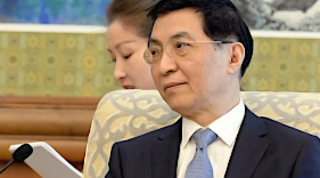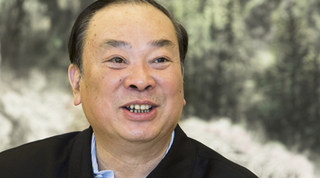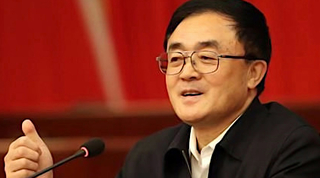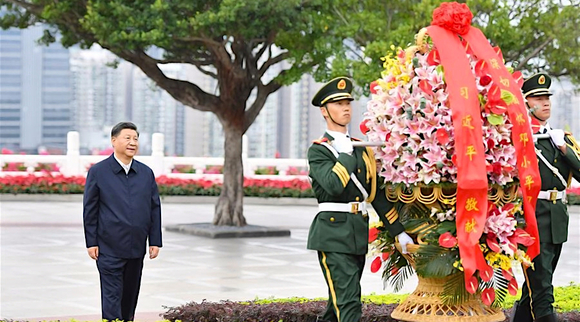second in our two-part forecast looking at the 6th Plenum and its precedents
Xi’s bid to walk a fine line between Mao and Deng
The forthcoming 6th Plenum is days away. In our 25 October signal we reviewed what precedent leads us to expect at such historic junctures.
who are Xi’s enablers?
If we are to learn anything from earlier 'super plenums' Xi needs to segue into a new narrative echoed by voices both fresh and authoritative.
By the 1990s, triumph in the Cold War was attributed to market capitalism and democracy. Some liberals in the PRC, raised on Maoist doctrine, were prepared to simply replace Marx with Hayek (who insisted prosperity was impossible without free markets). Shanghai scholar Wang Huning 王沪宁 was among the sceptics. Adopting democracy as the mark of modernity would, he suggested, create chaos, not least when traditional societies aspire to modernise. Strong leadership would be needed to avert it.
A state’s strength would be a function of its leaders’ capacity to halt social polarisation, their ability to plan and concentrate resources for vast projects. Wang’s ideas won favour, and he rose as an enabler of all Deng’s successors.
Wang returned from a six-month US tour in 1988, remarking that, unconstrained by cultural values, money ruled. The state should remain ethically responsible for the market; this lesson has remained steadily in his focus.
For Wang, building new ‘core values’ was a key step. Framing ‘culture’ as an essential shaping force of politics is, however, easier said than done. A list of those values, proclaimed in 2014, left much to be desired; critics blasted them as ‘camels’: ungainly, committee-designed, and irrelevant to the general public.
Reprising Wang’s elevation from academe to the Party’s Central Policy Research Office, his protégé Lin Shangli 林尚立 (see our latest horizontal position) appears well-suited to carry on Wang’s themes in updated form. In recent writings he subtly shifts the basis of the Party’s legitimacy (its ‘right to rule’) from both Maoist class struggle and egalitarianism, and Dengist development, to its ‘rationality’ and ‘efficacy’.
This eases the tension between the Maoist 'left' and the Dengist 'right', reducing the need to match the charisma of the great PRC patriarchs. It also uncannily echoes the theoretical language of Stanford University’s Francis Fukuyama who has a broad following in the PRC, that just may include Lin Shangli.
is Xi a Party innovator?
Since taking the helm Xi has been honing his innovation credentials. Early on he implicitly turned the Deng-era concentration on growth inside-out. Repurposing Party values and faith and reasserting Party control has seen his brand of socialist modernisation thrive—burnishing ‘high-quality’ development, law-based governance, common prosperity, ethnic assimilation, stability maintenance, and reunification (Taiwan). These 'thoughts', equipped with new variations: strategic, historical, dialectical, innovative, baseline and legal thought, could underscore Xi’s claim to innovation as a ‘rational and effective’ leader.
where does common prosperity fit?
Deng had ruled that China should achieve efficiency, paying ‘due attention’ to social equity and justice. But the shortfall in social justice had, by the Hu Jintao era (2002-2012), become pressing: the Gini coefficient showed inequality outpacing GDP. Measures promised at the 2007 National Party Congress were demoted as Beijing hastened to progress its vast stimulus package in the wake of the Global Financial Crisis.
Social justice issues continued to simmer. Common prosperity was dusted off again in June this year, as Xi makes a late run at assuaging the public. He had championed ‘moderate prosperity’ and an end to absolute poverty, but had not factored in ‘relative deprivation’. Where destabilising forces are lurking is not among the recently uplifted. It’s in the ‘middle income trap’, in blowback from middle classes facing predatory stock exchanges, calamitous real estate markets and intractable education and health systems. The solution, say liberal economists like Wang Xiaolu 王晓鲁 National Economic Research Institute, cannot be a reversion to the market-averse Mao era. All the signs are that common prosperity while politically aimed at rising pockets of wealth, is not anti-market.
will Xi’s 'new line' rate?
Testing his new line, Xi Jinping heralded a ‘new era’ in 2017, relabelling it a 'new development stage' in 2021. His proclaimed ‘rejuvenation of the nation’ has much to contend with. Lamented by Premier Wen Jiabao in the Hu Jintao era (2002–12), much of the economy (above all the property market) remains, in Wen's words ‘unbalanced, unstable, uncoordinated and unsustainable’. An ‘involuting’ class structure (where rich get richer, and poor get poorer) and a tough green ‘transition’ are ever more at odds with public expectations. Unification with Taiwan has gone sideways. Links with the West and regional rivals are at best volatile as ever.
Two broad options for Xi’s line entail claims to
- outdo either Mao (in a ‘left’ direction) or Deng (in a ‘right’ direction). These radical options imply, respectively, tighter closure or broader opening in economic, cultural, etc., terms.
- split the difference between the extremes. This may involve abstracting some policy dimensions they have in common. Without negating them, define a ‘path not taken’ by either—and now ‘take it’, with great fanfare and solemnity.
Lin Shangli’s drumbeat of rationality and efficacy might provide the narrative for the second.
profiles

Wang Huning 王沪宁 | Politburo Standing Committee Member
A well-travelled and well-published political scientist at Fudan University, Wang led a student team to win a Chinese-language debate in Singapore in 1993. This earned him nomination to head the Party’s official policy think tank, the Central Policy Research Office. Successful, he helped formulate the then-fashionable post-Marxian political doctrine of neo-authoritarianism, arguing that a capable and centralised leadership is indispensable to ‘modernisation’, long a byword for legitimacy. With the socialist bloc crumbling, this had life-saving advantages for the Party; Wang would have few rivals as ideological consigliere, famously equipping a series of general secretaries, who lacked intellectual skills beyond Mao-era infighting, with impressive theoretical ‘innovations’. His promotion to the Politburo’s Standing Committee in 2017 raised some eyebrows: after ill-fated Gang of Four honcho Zhang Chunqiao 张春桥 in 1973, ‘intellectuals’ were rarely welcomed above the functional ranks to the real deal-making circle.

Huang Kunming 黄坤明 | Propaganda Department head
The task of drafting a third historical resolution is rumoured to be in the hands of Huang, undistinguished as a theoretician. This would end the chain of senior Party figures like Ren Bishi, or theory pundits like Hu Qiaomu and Hu Sheng (see must-haves for a ‘super’ 6th Plenum). In the 1990s Huang, then mayor of Longyan (Fujian), worked with Xi who was also posted in Fujian and setting up a patronage network there. Huang would follow Xi to adjoining Zhejiang, where the network grew further. Specialising in the ‘kingmaker’ function, he rose in the province’s propaganda apparatus on Xi’s promotion to PRC vice premier in 2007. On Xi’s eventual victory over Bo Xilai in 2013 to emerge as Party general secretary, Huang at once became a Propaganda Department deputy head. By Xi’s second term ( 2017– ), Huang was head.

Qu Qingshan 曲青山 | Central Institute of Party History and Literature director
Curator of official Party history, Qu is like his predecessors an intellectual enabler, designing new versions of Party history. Qu has since 1984 specialised in 'propaganda' as opposed to 'politics'. He has been prominent in repurposing the once nationalism-denying, anti-'Han chauvinist' and Marxist CCP as the rejuvenator of national glory under ‘core leader’ Xi Jinping. Appointed director of the Central Institute of Party History and Literature, a fount of orthodox Party history, in 2019, he joined the Central Committee in 2020.
context
1 Jul 2021: Xi proclaims a watershed: the PRC has ‘defeated poverty’ and, with consolidated Party leadership, is realising goals of socialist modernisation and national revitalisation
20 Feb 2021: Xi launches a new campaign to study Party history
26–29 Oct 2020: 5th Plenum announces China will enter the ‘new development stage’ in 2021 24 Oct 2017: Xi Jinping’s Thoughts on Socialism with Chinese Characteristics in the New Era was written into the Party constitution at the 19th Party Congress, and became the guiding thoughts of the Party
24 Oct 2017: the Two Centenaries as defined by Xi are written into the Party constitution at the 18th Party Congress: (1) that in 2021, the CCP’s centenary, a ‘moderately prosperous’ (xiaokang) society will have been achieved; and (2) that in 2049, the PRC’s centenary, the nation will have been rejuvenated as a ‘strong, democratic, civilised, harmonious and modern socialist country’
18 Oct 2017: Xi’s second presidential term is launched at the 19th Party Congress; China has, he proclaims, entered into a ‘new era’: the principal contradiction (Maoist category) is now between unbalanced and inadequate development, and the people’s mounting demands for a ‘better life’
19 Aug 2013: Xi proclaims ‘thought work’ to be as important as economic development as a central task 5 Jan 2013: Xi proclaims ‘two do nots’ (do not negate either Mao Zedong’s pre-reform or Deng Xiaoping’s post-reform era
15 Nov 2012: Xi succeeds Hu Jintao 胡锦涛 as Party Secretary at the 18th Party Congress
8 Nov 2012: Hu Jintao derogates the ‘moderately well-off’ life now enjoyed by many as not good enough at the 18th Party Congress: it is less than all-inclusive and riddled with gaps
